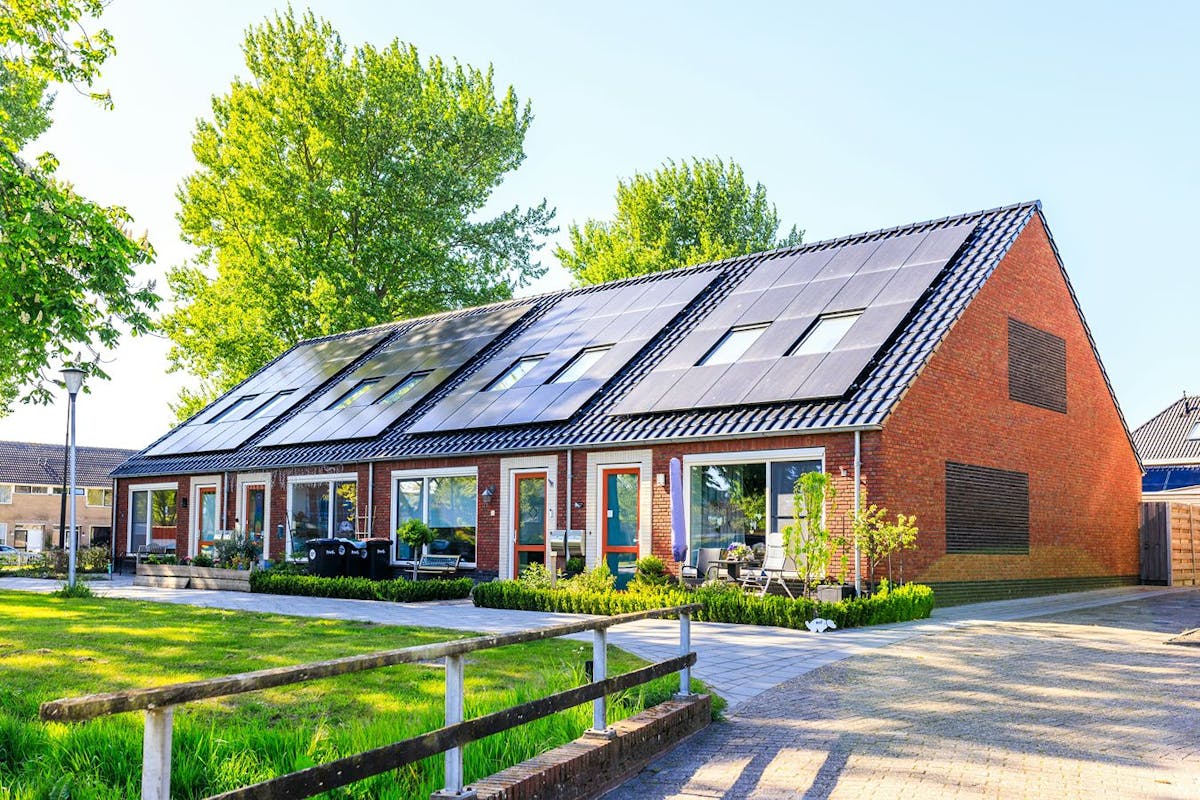20 Questions to Ask Your Solar Installer
Last edited

Author
Andrew Giermak
Solar and Electrification Writer and Editor

Editor
Andrew Blok
Electrification and Solar Writer and Editor

Home solar panels can reduce your electricity bill for decades. But, if you’re thinking, “Really?” or, “What’s the catch?” or, “How do solar panels even work?” You’re not alone.
Whether you’re paying the cost of solar panels upfront and buying them, or getting a solar lease, it’s important to understand your investment. Asking the right questions can help you find the best solar company, the best system for your home, and weed out any bad deals along the way.
See how much you can save by going solar with Palmetto
20 questions to ask a solar installer
To achieve the best possible experience when you go solar, let’s play a game of 20 questions you can ask at your next solar consultation.
1. How much will solar panels save me?
While you’ll still receive an electricity bill after going solar, you should save money. While it’s impossible to predict exactly how much solar panels can save you, installers can give you a reasonable estimate. Your actual savings will depend on how much your electricity rates change and whether incentives like net metering shift during your solar panels’ lifespan.
Your savings will also shift throughout the year, thanks to solar seasonality. It’s useful to get a clear understanding of your potential savings throughout the year and over the projected lifetime of your solar installation.
2. What solar incentives are available?
Asking your installer about available incentives is important to maximizing the value of your investment. Whether or not you qualify for local solar incentives may significantly impact the return on investment of your energy system.
Around the country, solar incentives vary greatly by state and region, with some cities, counties, and utilities offering their own programs, tax credits, tax exemptions, rebates, and more.
3. Do you sell or lease your solar panels?
Decide whether you will buy or lease a solar system based on your personal preferences, financial goals, and available options and make sure your installer can deliver what you want.
Buying means the system is your property and, in most cases, you will save more over the lifetime of your systems. A lease or power purchase agreement, such as Palmetto’s LightReach Energy Plan, will give you solar power from a home system with no upfront cost and manageable monthly payments.
4. Do you offer financing options?
Unless you’re able to pay for your panels upfront or are leasing them, you may need to finance your system through a loan. Many reputable solar installers offer loans, though you can always shop around..
By working with a company with multiple financing options, you are more likely to find a solar loan structured to fit into your budget that can unlock your long-term savings on electricity.
5. What type of solar panels do you install?
One of the most common questions solar companies are asked is, “What type of panels do you install?”
While there are differences in performance among solar panels, you probably don’t need to stress over the options. In some instances it may be beneficial to pay a bit more for highly efficient solar panels, you can typically achieve your savings and energy goals with multiple solar panel options, so long as your installer can provide solar panels of typical efficiency (around 20%) and wattage (350 watts and above).
6. What do your warranties cover?
You will likely have multiple solar warranties (product, performance, installation) associated with your energy system.
Before signing on the dotted line, talk to your installer about exactly what each of these warranties covers, how long the coverage periods are, and if you can extend the policies during the lifetime of your solar panels.
7. What if a part of my system breaks?
Along with warranty coverage, you should talk to your installer about the likelihood of system damage and what repair or maintenance procedures will be, even if solar panel maintenance is typically infrequent.
If you’re covered by a maintenance and monitoring plan, your installer will have a dedicated customer service team that can field your request and repair the part as soon as possible, ensuring your system will be back up and running without excessive time offline.
8. Can I add more solar panels later?
If you purchase an electric vehicle or grow your family, your electricity consumption will grow. If you anticipate you may want to expand your solar energy system in the future, talk to your installer about this possibility and what an upgrade may look like.
Depending on system setup and available space, it may be a better idea to oversize your solar system initially rather than add panels later. Or, your installer may make expanding easier by designing a microinverter-based solar system.
9. How long is the installation process?
A company that sets an installation timeline (and has the past projects to prove it) is more likely to deliver a good end result. When talking to your solar installer, ask them about the anticipated installation schedule.
Although they may not be able to tell you a precise interconnection date during your initial conversation, reputable companies should be able to provide a breakdown of your solar installation timeline, including permitting, equipment delivery, and construction.
See how much you can save by going solar with Palmetto
10. Do you have a customer referral program?
If your installer has a referral program, it’s a strong sign they are used to delivering good customer experiences. As the best advocates for any company are its customers, many solar companies will compensate those who refer new business in bill credits or cash.
11. Can you explain the total cost of a system?
If a solar contractor gives you a price and doesn’t explain how they arrived at that number, it’s a red flag you may not be getting the best deal possible. Although the average cost of solar panels varies across the country, the total price of any solar energy system can be broken down into hard and soft costs, including expenses associated with hardware, permitting, labor, and business overhead.
12. Should I install a string inverter or microinverters?
Inverters turn the electricity your solar panels generate into electricity you can use at home. String inverters and micro-inverters are the two main options. As every home solar project is different, choosing the right technology can maximize your system performance and return on investment.
13. When will my system pay for itself?
If you purchase or finance your solar energy system with a reputable solar installer, they should be able to forecast an approximate break-even point at which your system will have paid for itself in savings.
In general, solar panel payback periods average somewhere between 7-10 years, depending on your location, the size of your system, and many other factors. A solar installer should be able to break down the expected performance of your system as it relates to the price of electricity in your area over time.
14. How do I track my solar panel performance?
Today, most solar panels are installed with smart components that report system performance directly to a digital landing page. The Palmetto App, for example, allows you to track your solar panel performance alongside your electricity consumption (with a supported meter).
15. What happens when my system reaches the end of its lifespan?
Even though it may be 20-30 years or more into the future, asking your installer about the end of your system's lifespan can help you avoid unwanted surprises later on.
Solar companies that plan to be around for decades are sure to have an answer for you when you ask about the decommissioning process. Critically, the end of your lease contract may give you options, like renewing your lease at a new rate, or buying out the system at the market value.
16. How long have you been in business?
In recent years, some solar companies have gone out of business. Working with an established, experienced solar company could help you avoid picking a company that’s going to go out of business.
A company able to answer all your questions in a helpful way without putting pressure on you is a sign of a partner you’ll be able to work with and depend on for a long time.
17. What should I do before I go solar?
Solar can supply you with the electricity you need to run your house, but reducing the amount of electricity you need can lead to savings, too. Getting an energy audit, upgrading your insulation, or electrifying your HVAC system or water heater may open the door to greater savings.
Your solar installer should be definitive about the state of your roof before installing solar panels. Your roof should be healthy at the time of installation, and replacing your roof and installing solar at the same time can save you time and money.
18. What other products do you sell? (Generators, EV chargers, home security, etc.)
Going solar can be a great time to also electrify your home with a heat pump or other efficient, electric appliances, install an EV charger, add battery storage, or replace your roof. You can find some of these and other energy-saving products, with savings for account users, in the new Palmetto app.
Combining projects could save you time and money, especially if you use the same company, and let you stretch your solar electricity farther.
19. What makes your company different from others?
When weighing your solar options, you should feel free to open up the discussion and allow installers to explain exactly why they deserve the job. A professional solar expert should want to give you all the info you need rather than stick to a sales pitch and make you feel forced into a decision.
20. Can I take my time and think about it?
In a high-pressure sales scenario, you may start to feel a solar installation company is pushing you to sign a contract right there, right now. If you feel rushed, asking for some time to make your decision will quickly show whether or not the company is acting in your best interest or is simply out to get your money.
Occasionally impending policy changes mean you need to rush, but even with those caveats, a reputable company should be happy to do follow-up calls and help you feel confident in your choice.
Finding the best solar installer
The right solar company should answer all your questions and concerns today and seem like a partner you’ll want to work with for 25 years or longer. Before, during, and after installation, is the solar installer listening to you and your needs? Or pressuring you into a specific plan, design, product, or deadline?
Your new home solar power system should deliver savings and reliable, clean, and renewable energy. It should be easy to understand and operate without extra work or stress.
Interested in seeing what it's like going solar with Palmetto? Or still have questions about solar in general? Get started today by using our solar savings tool or contacting a Palmetto solar expert.
See what solar can do for you:
Frequently asked questions
How do you prepare for a solar installation?
Before you go solar, get to know your energy usage and current utility bills. You can check your property’s suitability for solar, including your roof’s health and shading, and confirm specifics such as net metering and other incentives apply to you.
How do you find a good solar installer?
It’s ok to interview and ask many, and even tough, questions of a solar installer before committing to a major project, a substantial amount of money, and years of working together. You are looking for a person or company that’s knowledgeable, experienced, professional, and helpful.
Can solar panels really save you money?
Millions of homes in the US are saving money with home solar panels. While solar panels aren’t a fit for every home, they can lower energy bills and generate long-term savings. A reputable solar company will be able to explain the savings potential of solar at your home, including when it’s too small to be worth it.


